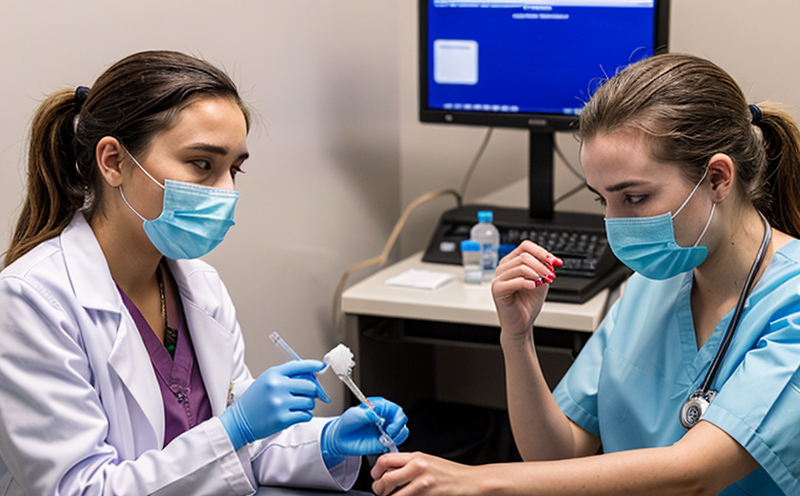EN 12323 Shigella Detection in Clinical Microbiology
The European Standard EN 12323 is a pivotal document that outlines the methodology for detecting and identifying Shigella spp. in clinical samples, which are associated with shigellosis or bacillary dysentery—a serious bacterial enteric infection. This service ensures accurate and reliable identification of Shigella bacteria, thereby supporting public health measures.
The standard covers various aspects including the collection, transport, and preparation of specimens from patients suspected to have shigellosis. Specimens are typically stool samples, but other body fluids like wound exudates or urine may also be relevant depending on clinical indications. Proper sample handling is critical for accurate detection as incorrect sampling can lead to false negatives.
The testing process involves a series of steps designed to maximize the recovery rate of Shigella spp. from the specimen while minimizing contamination by other microorganisms. This includes the use of selective media, enrichment broth, and various biochemical tests that differentiate between different species within the genus Shigella based on their metabolic characteristics.
One of the key aspects of this service is ensuring compliance with international standards such as EN 12323. Compliance ensures that laboratories meet stringent quality assurance criteria, which are crucial for maintaining high diagnostic accuracy and reliability in clinical settings. Additionally, adhering to these standards helps ensure consistency across different laboratories performing similar tests, leading to more reliable data and improved patient care.
The detection of Shigella spp., particularly species like Shigella flexneri, is essential for timely diagnosis and appropriate treatment. Misdiagnosis or delayed identification can have severe consequences ranging from prolonged illness to complications that require hospitalization. Therefore, this service plays a vital role in ensuring rapid and accurate detection which aids healthcare providers in making informed decisions about patient management.
Compliance with EN 12323 also facilitates international collaboration by enabling results generated within one country or region to be accepted and interpreted consistently elsewhere. This interoperability is particularly important given the global nature of infectious diseases like shigellosis which can spread rapidly across borders.
- EN 12323 specifies detailed procedures for sample collection, transport, and processing.
- The standard recommends specific media and reagents that enhance the recovery rate of Shigella spp.
- It includes criteria for interpreting test results to differentiate between different species within the genus.
Why It Matters
Detecting Shigella spp. early and accurately is crucial for effective management of shigellosis cases, which can range from mild self-limiting diarrhea to severe dysentery requiring intensive care. Early diagnosis allows for prompt initiation of antimicrobial therapy, reducing the duration and severity of illness.
Accurate identification also helps in understanding the epidemiology of the disease by identifying the specific strain responsible for outbreaks. This information is vital for public health interventions such as outbreak investigation, contact tracing, and preventive measures like vaccination campaigns or improved hygiene practices.
In addition to its medical importance, accurate detection supports research efforts aimed at developing new treatments and vaccines against shigellosis. By providing reliable data on the prevalence and characteristics of Shigella spp., this service contributes significantly to scientific advancements in microbiology and infectious diseases.
Customer Impact and Satisfaction
For healthcare providers, accurate detection through EN 12323 ensures they have the necessary information to make timely decisions regarding patient care. Prompt diagnosis enables early initiation of appropriate treatment regimens, leading to better outcomes for patients.
Laboratories that offer this service benefit from increased confidence in their results due to strict adherence to international standards like EN 12323. This enhances customer trust and satisfaction among healthcare professionals who rely on laboratory reports for clinical decision-making.
From a broader perspective, ensuring consistent and accurate detection across different laboratories contributes positively towards improved public health outcomes by facilitating effective disease control measures at both local and international levels.
International Acceptance and Recognition
- The results from EN 12323 compliant laboratories are widely recognized globally, fostering trust in diagnostic accuracy across borders.
- It is accepted by regulatory bodies such as the World Health Organization (WHO), Centers for Disease Control and Prevention (CDC), and European Medicines Agency (EMA).
- Compliance with this standard facilitates seamless collaboration between healthcare institutions worldwide, enhancing global health security.





